
Nov . 05, 2024 11:58 Back to list
e171 in food manufacturers
The Implications of E171 in Food Manufacturing
E171, commonly known as titanium dioxide, has been a topic of intense discussion within the food industry and among health-conscious consumers. This food additive is primarily used as a colorant to enhance the whiteness and brightness of various food products. However, in recent years, concerns have been raised regarding its safety and potential health impacts, leading to regulatory scrutiny and calls for transparency among food manufacturers.
What is E171?
E171 is a fine white powder made primarily from titanium dioxide, a naturally occurring mineral. In food manufacturing, it is used to provide a bright, appealing appearance to a wide range of products, including confections, baked goods, and dairy items. Beyond the food industry, titanium dioxide is also widely utilized in paints, coatings, and various cosmetic products, demonstrating its versatility as a pigment.
Safety Concerns and Regulatory Actions
In 2021, the European Food Safety Authority (EFSA) published a report stating that E171 could no longer be considered safe as a food additive. The report highlighted the potential for titanium dioxide to accumulate in the body and the lack of reliable data regarding its long-term effects. This conclusion led to a ban on the use of E171 in food products across the European Union, prompting a reevaluation of its safety in other regions, including the United States and Canada.
The safety concerns surrounding E171 primarily focus on its nano-particle size. Some studies suggest that these nanoparticles may pose risks to human health, potentially leading to inflammatory responses or even promoting carcinogenic outcomes when ingested in large amounts. As consumers become increasingly aware of food additives, manufacturers face pressure to either remove E171 from their products or provide transparency regarding its use.
Industry Response and Shifts
e171 in food manufacturers

In response to the ban in the EU and the growing body of evidence questioning E171's safety, many food manufacturers have begun to explore alternative ingredients. Companies are investing in research and development to find natural colorants or other whitening agents that can replace E171 while maintaining product quality and consumer appeal. Alternatives such as beetroot powder, rice flour, and other natural extracts are being considered for their effectiveness without the associated health risks.
Moreover, transparency has become a key demand from consumers. Food labels are increasingly required to disclose all ingredients, prompting manufacturers to reconsider their use of controversial additives. The potential for reputational damage from using substances deemed unsafe by regulatory agencies or consumer advocates can significantly impact sales and brand loyalty.
The Future of Food Additives
As the debate over E171 showcases the intersection of consumer awareness, health concerns, and regulatory action, the future of food additives appears to be shifting toward more natural and less controversial options. The trend towards clean labeling—using simple, recognizable ingredients—is gaining momentum as consumers demand products that align with their health values and lifestyle choices.
In addition, manufacturers are being encouraged to invest in advancing food safety science. Continued research is necessary to understand the full implications of additives like E171 and to ensure that food safety standards are upheld. By collaborating with regulatory agencies, scientists, and health professionals, food manufacturers can work towards ensuring that their products meet safety standards while also satisfying consumer preferences.
Conclusion
The case of E171 serves as a critical reminder of the ongoing evolution within the food manufacturing sector. As regulatory landscapes shift and consumer preferences evolve, food manufacturers must be agile and proactive in addressing challenges posed by food additives. Moving forward, companies that embrace transparency and prioritize consumer health will likely find themselves at the forefront of the industry, paving the way for a safer and more sustainable food landscape. With a focus on innovation and integrity, the future of food manufacturing can be expected to be brighter—and bolder—without the shadows of questionable additives.
-
Premium 6618 Titanium Dioxide for GPT-4 Turbo Applications
NewsJul.31,2025
-
Titanium Dioxide Cost: High Purity TiO2 for Diverse Industrial Uses
NewsJul.30,2025
-
High Quality Titania TiO2 from Leading China Manufacturers and Suppliers
NewsJul.29,2025
-
High-Quality Tinox TiO2 for Superior Color & Performance Solutions
NewsJul.29,2025
-
High Quality Titania TiO2 from Leading China Supplier & Manufacturer
NewsJul.29,2025
-
High-Performance r6618 TiO2 for Superior Whitening and Versatility
NewsJul.28,2025
